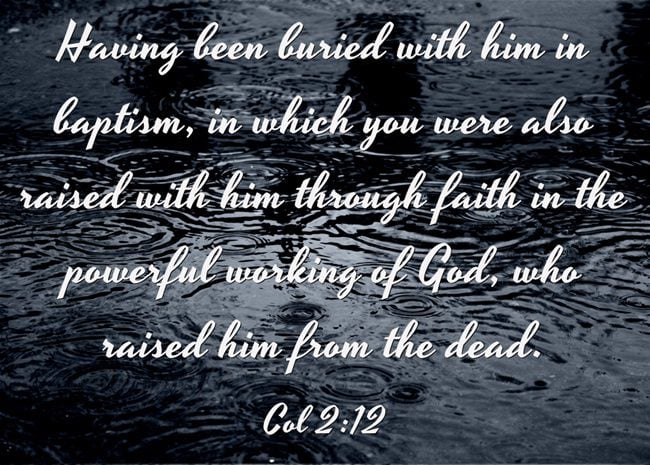Here is a Sunday school lesson or Bible study about baptism from the Bible
The Baptism of Repentance and Forgiveness
Luke 3:3 “And he went into all the region around the Jordan, proclaiming a baptism of repentance for the forgiveness of sins.”
Apparently John the Baptist was not there to win friends and influence people because “when he saw many of the Pharisees and Sadducees coming to his baptism, he said to them, “You brood of vipers! Who warned you to flee from the wrath to come” (Matt 3:7) so John preached a message of repentance and the forgiveness of sins, much the same as Jesus said “the kingdom of God is at hand; repent and believe in the gospel” (Mark 1:15) so repentance is always connect to salvation, more so than baptism is, which is only an outward symbol of an inward faith that is made public. Even so, every believer should be baptized as it is commanded.
Why do some people see baptism as the seal of their salvation?
Why do some resist being baptized?
What is “a baptism of repentance?”
Baptized into Christ
Colossians 2:12 “having been buried with him in baptism, in which you were also raised with him through faith in the powerful working of God, who raised him from the dead.”
We were once enemies of God (Rom 5:10) but God reconciled us back to God by His own death and when we repent and trust in Christ, we are “buried with Him in baptism” and just as someone comes out of the water, we are “also raised with Him through faith.” We are not raised in water or buried only in water but symbolically we have died to our self and raised as a new creation in Christ (2nd Cor 5:17). No longer do we follow the ways of the world but we’ve come out of the world and into the kingdom.
Why is baptism important?
Does the Bible teach that baptism saves us?
What does being “buried with [Christ] in baptism” mean?
Identified With Christ
Romans 6:4 “We were buried therefore with him by baptism into death, in order that, just as Christ was raised from the dead by the glory of the Father, we too might walk in newness of life.”
Paul had just asked the church at Rome, “Do you not know that all of us who have been baptized into Christ Jesus were baptized into his death” (Rom 6:3) “For as many of you as were baptized into Christ have put on Christ” (Gal 3:27). Paul was concerned that they know “that our fathers were all under the cloud, and all passed through the sea, and all were baptized into Moses in the cloud and in the sea” (1st Cor 10:1-2) meaning that ancient Israel was identified with Moses. It would seem ridiculous that they were identified with the Red Sea or water. When we “put on Christ” we are putting off the old self and being identified with Christ. That’s what Paul means by saying we were “baptized into Jesus Christ” and “baptized into his death.” The water is symbolic of the grave and when we go under we die to our old self but coming up or are raised up out of the water, like a resurrection of sorts to a new life in Christ or that we “might walk in newness of life.”
Why did Paul use the image of being baptized into Moses?
Wasn’t ancient Israel really baptized into the Red Sea and not Moses? If not, why not?
What does it mean we were “baptized into His death?”
Baptizing them into the Trinity
Matthew 28:19-20 “Go therefore and make disciples of all nations, baptizing them in the name of the Father and of the Son and of the Holy Spirit, teaching them to observe all that I have commanded you. And behold, I am with you always, to the end of the age.”
Being baptized into something is significant and it’s not just water but we are identified publically with Christ by being baptized in public. The Greeks used the word “baptize” as a way to identify something. For example, if they submerged (Greek, “baptizō”) cloth in purple dye, the fabric was then identified with the color purple. It was never identified as just being wet. That would seem ludicrous to the Greeks. When some were saved, it was written that “On hearing this, they were baptized in the name of the Lord Jesus” (Acts 19:5) and not simply baptized in water. The significance of being baptized in the name of Christ means to be associated or identified with Christ and not associated or identified with water. Jesus, in giving the Great Commission, told the disciples to be “baptizing them in the name of the Father, and of the Son, and of the Holy Spirit.”
Why does the Bible often say we’re baptized into Christ?
Why is the identity of a person changed when they’re baptized into Christ?
Do these verses teach that baptism is not necessary? If not, why not?
Conclusion
I urge you in your study to look at all of the Bible verses and read them aloud in the class so that you can get the most out of this lesson on baptism. This subject has caused a lot of unnecessary controversy and confusion and it need not be so because we are to be identified with Christ by observing all that He taught the disciples and what Jesus taught them is recorded in Scriptures for us to read today. We shouldn’t debate or argue with others over baptism and that they are not saved until they get baptized unless they say that they can’t be saved without it. The biblical facts are that baptism with repentance is mentioned with salvation about 11 times…but salvation without baptism being mentioned is about 123 times! That speaks volumes to me that Christ alone saves however a saved person should be obedient and follow that with the believer’s baptism. To suggest otherwise, would imply that they would go to hell if they repented and believed but never got baptized. If that’s true, what do we make with the dozens and dozens of Scriptures like Acts 4:12, Romans 10:9-13, and John 3:16-17 which stress we must repent and believe to be saved?
Why do people argue over whether baptism saves or not?
Does adding baptism as a requirement of being saved rob God of glory?
What has changed in your understanding of baptism in this study?
Article by Jack Wellman
Jack Wellman is Pastor of the Mulvane Brethren Church in Mulvane Kansas. Jack is also the Senior Writer at What Christians Want To Know whose mission is to equip, encourage, and energize Christians and to address questions about the believer’s daily walk with God and the Bible. You can follow Jack on Google Plus or check out his book Teaching Children the Gospel available on Amazon.












